|
|
|
Sort Order |
|
|
|
Items / Page
|
|
|
|
|
|
|
| Srl | Item |
| 1 |
ID:
130684


|
|
|
| 2 |
ID:
107444
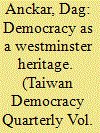

|
|
|
|
|
| Publication |
2011.
|
| Summary/Abstract |
Conventional wisdom from colonial history research has it that the states which
the British left behind them were better equipped for democratic government
than the states that had belonged to other colonial powers. Investigating the
democracy fortunes of all fifty-four territories that were freed following World
War II from British control, and applying Freedom House ratings to determine
democracy status, this study examines the belief that democratic government
has become a characteristic feature of former British possessions. Findings are
that the former colonies may be ordered roughly into three groups. Whereas
seventeen countries since 1972 have always, or almost always, been classified as
democracies, a larger portion, consisting of twenty-three countries, has always,
or almost always, been ranked as non-democracies. The remaining fourteen
countries represent an in-between category. On the whole, therefore, the idea
that democracy is a central part of the Westminster heritage overall cannot
be supported. Explanations for the division of the former colonies into three
groups have been researched in different directions, and the efforts substantiate
earlier observations in the literature on the relevance to democratization of
factors that relate to state size, modernization, and geography. Concerning the
impact of the length of colonial rule, the findings confirm an earlier suggestion
by Samuel Huntington that colonies which had a long British presence have
been particularly well equipped to develop into stable democracies.
|
|
|
|
|
|
|
|
|
|
|
|
|
|
|
|
| 3 |
ID:
111662
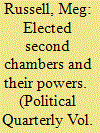

|
|
|
|
|
| Publication |
2012.
|
| Summary/Abstract |
In May 2011, Britain's Conservative/Liberal Democrat coalition government published proposals for reform of the House of Lords. In a White Paper and draft bill they set out detailed plans for a largely or wholly elected second chamber. These marked the latest stage in a long-running debate on Lords reform. The government's proposals aim to change the composition of the second chamber, suggesting that there will be no change to its powers or the conventions governing relations with the House of Commons. But this expectation has been disputed. The House of Lords presently does not make full use of its powers, and many anticipate that it would if its members became elected. This paper reviews the composition of all second chambers internationally, showing that wholly directly elected chambers make up the minority, and that both mixed chambers and indirect election are common. It then reviews the formal powers of all largely and wholly elected chambers. This shows that amongst parliamentary systems the formal powers of the House of Lords are relatively great. But second chamber powers, as well as their composition, vary widely.
|
|
|
|
|
|
|
|
|
|
|
|
|
|
|
|
| 4 |
ID:
118223
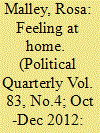

|
|
|
| 5 |
ID:
096259


|
|
|
|
|
| Publication |
2010.
|
| Summary/Abstract |
The return of a hung parliament at the 2010 general election is a serious possibility. But due to Westminster's limited recent experience of parliaments under 'no overall control' there is little institutional memory in Whitehall or Westminster, and even less public understanding, of what the implications would be. This article sets out to analyse the principal challenges that would be faced by government, opposition, parliament and the media in the event of a hung parliament. Drawing on experience from Canada, New Zealand and Scotland, we discuss the difficulties that may arise during the immediate government formation process and in the course of making minority or multiparty governance work on an ongoing basis. We conclude that a hung parliament need not undermine political stability or effective governance, but that all actors would need to adapt their behaviour and should therefore prepare carefully for this eventuality.
|
|
|
|
|
|
|
|
|
|
|
|
|
|
|
|
| 6 |
ID:
084361
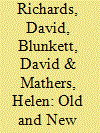

|
|
|
| 7 |
ID:
110533
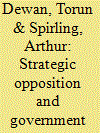

|
|
|
|
|
| Publication |
2011.
|
| Summary/Abstract |
Cohesive government-versus-opposition voting is a robust empirical regularity in Westminster democracies. Using new data from the modern Scottish Parliament, we show that this pattern cannot be explained by similarity of preferences within or between the government and opposition ranks. We look at differences in the way that parties operate in Westminster and Holyrood, and use roll call records to show that the observed behavior is unlikely to be determined by preferences on any underlying issue dimension. Using a simple variant of the agenda-setting model-in which members of parliament can commit to their voting strategies-we show that the procedural rules for reaching collective decisions in Westminster systems can explain this phenomenon: in the equilibrium, on some bills, members of the opposition vote against the government irrespective of the proposal. Such strategic opposition can reinforce government cohesiveness and have a moderating effect on policy outcomes. We introduce new data from the House of Lords, the Welsh Assembly, and the Northern Ireland Assembly to distinguish our claims from competing accounts of the data.
|
|
|
|
|
|
|
|
|
|
|
|
|
|
|
|
| 8 |
ID:
099785
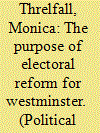

|
|
|
|
|
| Summary/Abstract |
Britain is facing a referendum on electoral reform for Westminster in 2011, yet there is little debate over the goals of such a change. Arguably, the purposes of political representation should determine the choice of a new system. Thus, ten modernising goals that go further than merely giving more seats to the Liberal Democrats are proposed. In a society made up of women and men, both need balanced representation. In an educated society, citizens need to be kept abreast of their MPs' performance as legislators so they can engage with parliamentary affairs. In an increasingly diverse society, the electoral system needs to improve who gets to be represented by whom, by providing citizens with more than one representative per district. The proposed Alternative Vote would provide few advantages and additional drawbacks, but could stimulate consensus around a modern system in tune with Westminster traditions.
|
|
|
|
|
|
|
|
|
|
|
|
|
|
|
|
| 9 |
ID:
105870
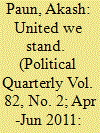

|
|
|
|
|
| Publication |
2011.
|
| Summary/Abstract |
Coalition government is an unfamiliar experience for Whitehall and Westminster. All actors are still adapting to the rules of this new political game. A number of governance challenges confront the United Kingdom's Conservative-Liberal Democrat coalition. It must strike a balance between the visions of two distinct parties and blend these into a coherent strategy for government. Like any government, it will expect to resolve most differences internally and then to show a united face to the world. Effective consultation and dispute-resolution processes within the executive will therefore be at a premium. But the separate political identities of the two parties also need to be preserved, and sufficient resources must be provided to each side within the government to enable this to happen. This article assesses the response of the coalition to these challenges in its first six months and draws lessons from relevant international experience.
|
|
|
|
|
|
|
|
|
|
|
|
|
|
|
|
| 10 |
ID:
161665
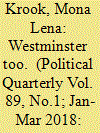

|
|
|
|
|
| Summary/Abstract |
At the end of 2017, millions of women used the #MeToo hashtag to draw attention to widespread sexual harassment and assault around the world. In British politics, female politicians, staff members, and journalists opened up about their own experiences, provoking the resignation and party suspension of a number of male Cabinet ministers and Members of Parliament. This article explores how this issue got on the political agenda, what features of politics might foster harassment and discourage reporting, and what solutions might be pursued to tackle this problem. It argues that sexual harassment should be understood as a systemic, cultural problem, rather than a question of problematic individuals. Ignoring the issue of sexual harassment in politics, the article concludes, has serious consequences for gender equality—as well as for democracy itself, reducing policy effectiveness, distorting the political pipeline, and diminishing political transparency and accountability.
|
|
|
|
|
|
|
|
|
|
|
|
|
|
|
|
|
|
|
|
|